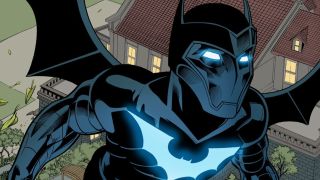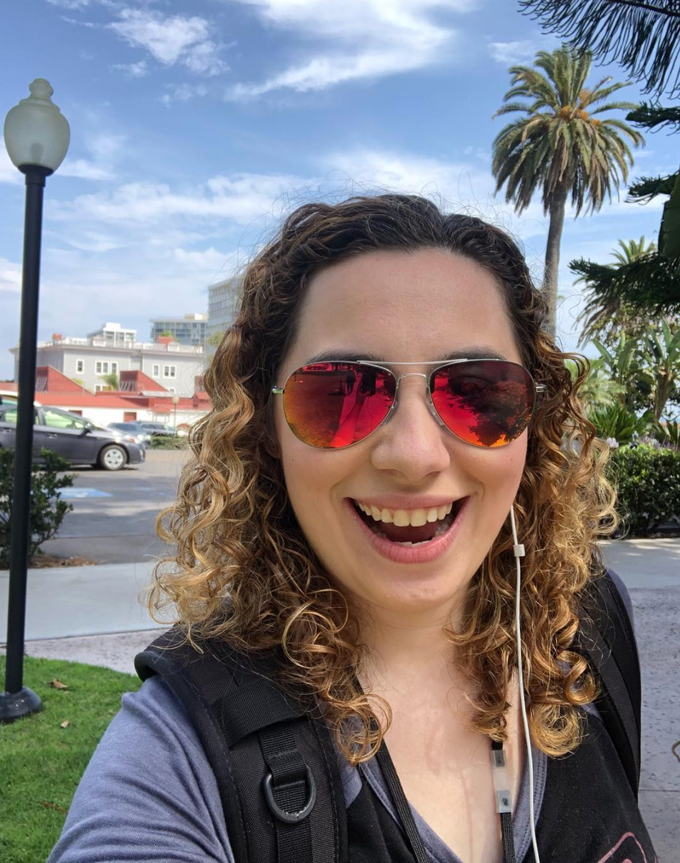After the future-set story of Future State: Next Batman and seeing Tim 'Jace' Fox fill out the role of Batman in the future, writer John Ridley has turned back the clock for a 'Batman: Year One' style exploration of how he became a hero...
... and how his whole family became (or in some cases already are) heroes.
In the new series The Next Batman: Second Son, Ridley is teaming with artists Tony Akins and Travel Foreman for the engrossing story of a modern family dealing with growing up, growing apart, and the struggles of both real-life and superhero life.
This all comes after Bruce Wayne's longtime business manager Lucious Fox is gifted Wayne Enterprises after the twisty-turny end of 'The Joker War.' Flush with new wealth and new responsibilities, Fox reaches out to bring the fragmented parts of his family back under one roof - including the prodigal son Jace Fox.
Currently underway now as a digital-first title, The Next Batman: Second Son follows Jace (on his way to possibly becoming Batman), but also his younger brother Luke (continuing his role as batwing), Lucious and his wife Tanya (dealing with Wayne Enterprises), as well as the two sisters - Tiffany and Tam.
With The Next Batman: Second Son underway digitally and a print edition going on sale April 6, Newsarama spoke at length with John Ridley about how Tim's 'Future State' narrative connects to Second Son, the importance of the Fox family, and families in general. Along the way, Ridley teases another big surprise coming in The Second Son.
Newsarama: John, The Next Batman: Second Son is a prequel to your Future State: The Next Batman story. How did doing it in this order affect each story?
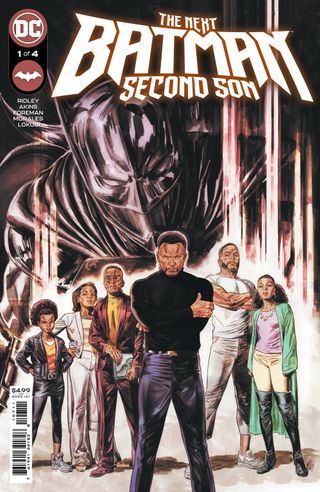
John Ridley: The whole process has been really good for me as a writer because we've been working on Tim/Jace Fox for well over a year. So, just in development, discussions, trial & error on my end, and things that have changed over at DC as a company - things have just been moving around a lot. But within that, it really allowed for a lot of experimentation behind the scenes before the public had an opportunity to see what we were doing or what we're thinking at all.
So, for me, that was great because jumping ahead to the future, even if things did not completely end up arriving at where we get to in 'Future State,' it was an opportunity to say these are elements of character, emotion, and story that we do want to get to at some point. And how do we arrive at them? What is the emotional velocity of the storytelling?
For me, that was really, really great in terms of saying this is where we want Jace to be ultimately, and then how do we get there? How do we back into that? It is a little odd because we were going from a future that may or may not exist or exist in some part to a past that did exist that a lot of people weren't aware of. So, they can arrive at a point where there is hopefully depending on how things go for Jace Fox in the here and now.
It's been a little mind-bending, but I mean, if you think about it in life - if you had an opportunity to see what your future is? If you were visited by the ghost of Christmas future? You get a little sense of what that future was, you were visited by the ghost of Christmas past, and you get to understand a little bit about where you've been and why one is how they are. I think it helps determine who you are in the here and now.
For me, Tim is just a character, but I try to treat these characters, all of them, that their motivations are real, that their aspirations are real, and that they're grounded in a sense. And it's not just, 'Oh I want to put on a Bat-suit because it'd be cool and somebody's paying me to do it.' But what is the character excavation? I would do that if it was a comic book, a TV show, a novel, a film, any other spaces that I've worked in. So, it's a bit unusual, but it's been really good.
Nrama: In this series, how close is Tim emotionally and mentally to what he'll become eventually as he is in Next Batman?
Ridley: What one will read in Second Son is very dialed into Tim Fox as he will be. The hard part is because you're asking me questions, some of them I can't answer for - not that I don't know the answer, but I can't talk about certain things right now, but I would say what you read in Second Son is very much Tim Fox's emotionality, that's his drive.
I think the question is in 'Future State,' does he arrive at that kind of Batman? Will he arrive at that kind of Batman? Do his motivations track? Is that a future that changes for all kinds of reasons, not just for Tim, but for any of the other heroes that were involved?
So, I would say that the 'Future State' version of Tim is a bit more on the speculative side. For all kinds of reasons, because it is a future that may not arrive, but Second Son Tim is very much the Second Son Tim/Jace that I want readers to read and be aware of. Whether people choose to read the series or not, for whatever reason, it's certainly very important for Tim/Jace as a character. Not just for Tim - for Tanya, for Lucius, for Tam, for Tiff, for Luke - for all of those characters.
They really are, I think for the first time, establishing the totality of the Fox family. In terms of Tanya and what she does, for Tiff for her perspectives, what's going on with Tam, for Luke as a person away from Batman and being Batwing. Who is he as a brother? Who is he as a son? So, I think all of those character traits, well, they're not just traits at this point. I would say they're true elements of character. And I think they're very important & very true and they will track should we see more of the Fox family in this regard going forward.
Nrama: What are some story threads from 'Future State' you wanted to include in this volume?
Ridley: There is a level of 'Future State,' we're still seeing Jace embrace the totality of being Batman. It's one thing to have a skill set. It's one thing to have a moral compass. It's another thing, like with anybody, to suddenly put all of those things into play. With Batman, Superman, and Wonder Woman, they had an opportunity to develop over time and years. You go back to some of their stories, it may be the elements of storytelling, art, or things like that don't necessarily hold up. But one thing that really makes these characters interesting is how they are inserted into the realities of that time period.
Superman arriving - one of his first missions is dealing with corrupt munitions dealers, which is a pretty heavy story, for a guy who's like from another planet dealing with just the realities of war and violence in the real world. Batman dealing with very super street-level crimes before he started developing a rogues' gallery. Wonder Woman arriving in a man's world caught up in war and a warrior princess who's fighting for peace. Those are real fundamental stories.
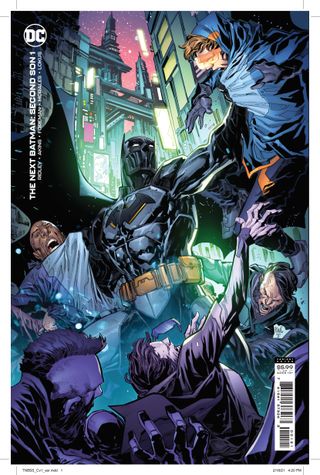
What I like about 'Future State,' even though there's so much future going on, that for Jace it's just about family. It's about his family. It's about those relationships. It's about a family that he runs into that's looking for a measure of justice that owns up to the crimes they've committed, but understand that they feel like they're living in a world where people aren't paying attention or can't really resolve - very human, very personal crimes.
Those are the elements that I want to keep going. It's not just that Jace shows up and he necessarily can fight the Joker or could be inserted into the middle of 'The Joker War.' Bruce's Batman, and the folks around them have earned this. 'Joker War' is a once-in-a-generation story and the storytellers earned it. It was cool on every level.
I don't think Jace should be showing up doing that because to me to make that character real. It's like you can be the best college quarterback, just have the best numbers, throw the most touchdowns, and do all that - going into the NFL is a whole different thing. You see it constantly. I think it would be weird to have Jace show up and suddenly win a Super Bowl versus he's got to learn a little bit. That's what I enjoy: this real 'Year One' sensibility and a reality with these characters.
Nrama: Have you mapped out in your mind when and how Tim eventually takes on the mantle of Batman? What can you say about that moment, and when we might see it (if ever?)
Ridley: Kat, you're too good of a journalist. You should be doing political writing. There are things that I can't talk about specifically, but I will say whether this was a comic book or a television series, for me personally, you have to know where it ends to start somewhere. You have to have character development.
One of the things that really annoys me in any space is when people start a TV series and are like 'I don't like where this character is starting.' Well, if the character started where they would end, there's no character development. All of us, I hope, we change over life. We progress. Even if we become more of who we are, which I think is a hallmark of human nature, that's still a change. It's a transformation, even if it's a very focused transformation.
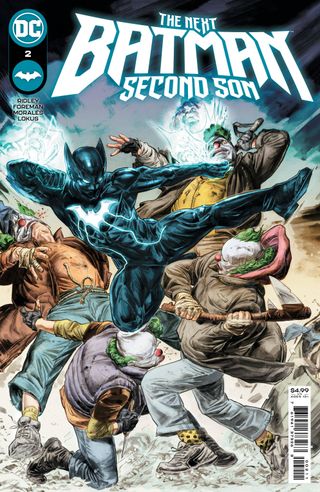
So, for me, as a writer, I want to go into it whether the corporation for whatever their needs are - says 'Yes, we want to do more.' It's too late as a writer for somebody to say, okay, you know what, we want to do another series with this, and you don't have any concept of where you want that character to go. Now, maybe you never get there for any number of reasons, but I think it's really important to have an understanding of where you want these characters to go.
The short answer is 'Yes, absolutely.' I know where I want these characters to go, whether they get there for any number of reasons, that's beyond my control, but I really think that it would be a dereliction of my duty as a writer to not start with an idea of where these characters could go down the road. If it's six more issues, if it's 12 more issues, if it's five more years, at least have an understanding.
It's like starting a road trip. You have to know where you're going. You can take all the detours you want, but if you're trying to get to a specific location, you got to know where that location is.
Nrama: Grifter appeared in the first digital chapter of this - a relatively deep cut in comics, even if he reappeared recently in James Tynion IV's Batman run. Are there any other deep cuts into past characters or storylines you're aiming to include in Second Son?
Ridley: All I'm going to say is 'Yes.'
Nrama: Deep cut or not, who else can we look forward to seeing in this book in future chapters? Will we see the likes of someone like Nightwing show up?
Ridley: I will say that there is a character showing up who I hope is very beloved in the DC universe. A character that I think is one of the really interesting characters in the DC universe. He, she, or they is a great character. I think underutilized. I could not be more excited to have this character come in and they will be very pivotal in explaining Jace's past. How Jace might have any capacity to potentially put the cowl on.
I think that when this character shows up it really helps indicate where Jace is going to fit in the larger DC Universe, and the kinds of characters that already exist in the DC universe that if there is more of Jace, the kinds of characters that you might see.
But to answer your question, yeah, most definitely. You're going to see some characters from the DC universe, but I think one in particular shows up that is really going to help bridge Jace's previous existence to the present into the larger Bat universe.
Nrama: James has told us he and Batman group editor Ben Abernathy are trying to make the Batline more cohesive than its been in over a decade. How is that working for you in co-existing with these other books going on simultaneously?
Ridley: One thing I've learned very quickly about James is he's absolutely remarkable in plotting, planning, and long-term study. I really admire that because it's something I really believe in, and he is so incredibly detail-oriented. Just having the opportunity to see some of his work, wherever my work was, I feel like it's just been elevated because he inspires. He just really, really does.
For the moment, Second Son is kind of its own thing. We definitely reference, allude to, and hopefully help set up some things that are going to be coming down the road for the larger Bat universe, but largely Second Son is really a platform for folks. Even long-time fans of the Bat universe, to have a better understanding of the Fox family and Jace. Jace, as everybody knows, has just been off the page and not even really name-checked over his existence or lack of existence.
So, it really is about supporting these characters, but absolutely because of what James has chosen to share with me and my admiration for his ability to long-term plan. We're definitely going to try to do everything we can to support things that are coming up under his leadership.
Nrama: Was this second series with this character always the plan when you began Next Batman (the first)?
Ridley: You have to plan for success. Success is not guaranteed and that's really determined by the readers - the fans. No matter how much one may plot and plan. But all of these things were planned in an existence. It wasn't like 'Future State' came out and went back for a second printing and everybody was like 'We have to do more Jace.'
I wanted to know and very fortunately Ben Abernathy, the group editor, was of the same mind. Just the reality of publishing, you can't just wait for the fans to decide. If the fans, the universe, economics, or whatever says, there's not going to be anymore you can shut things down on a dime, but you can't really just walk to the starting line and start sprinting. You have to warm up, you have to be ready, you have to be prepared. I'm very sorry that a lot of this is devolving into sports metaphors, but there is preparation that has to be done.
We were prepared with Second Son, and very fortunately fans responded. So, we went forward with that, and if folks continue to respond, it meets the company's needs - we're ready for whatever comes next. But I will say that the parsing of those conversations about that, for all kinds of reasons, we're not ready to have them next.
I would just say as a person, as a writer, if you're asking me about a TV series, I would say, of course, I plan for three seasons, four seasons. Three is the new five, but if it doesn't get picked up, it doesn't get picked up. Nothing I can do about that. But if it got picked up, I wouldn't want to scramble and go 'Oh my God, now I have to come up with a second iteration of the series.' We're ready to go.
Nrama: From a writing perspective, since this is being released in digital chapters and then a print release, does that affect your writing groove at all? Do you plan for each chapter or each physical issue?
Ridley: That's a really good question.
I got to say if I have a groove at all - I mean I barely had a groove in 22-page comic book writing. A lot of it is learning on the fly. I will say, this 10-page weekly version of it - at first, I was like 'I don't know if I can do this,' but I love it. I love minimalism. I love tightness. I love sharpness. I love not overstaying my welcome - getting those 10 pages done, getting them turned around, getting them to the artist, getting to the next chapter has been great. I just turned in I think 10, maybe 11, I think this morning, last night, or we're going to the last one - I think 12.
It's been really enjoyable. It's all new to me. But in the newness, I also think that I'm not locked into - 'Oh, I've been doing this, this way for 25 years. How do I do it in a different format?' It's just been great. If it's 10 pages, great, 20 pages, great, 22 pages, great. Other History of the DC Universe, when we were doing that, they were whatever - 36 pages, 40 pages - all prose.
I've just been fortunate because I've done enough where I feel like I'm not making rookie mistakes, but I'm not so much of a veteran that it's like, 'Wait, I've never done 10 pages. I can't - that's beneath me: 10 pages.' I love it so much. Now, I've done multiple short stories. I can't tell you how blessed I feel to be able to do this.
And I will say this very sincerely, I love talking to the comic book/the sci-fi - individuals like yourself, the reporters, the journalists. Very sincerely, you guys bring excitement to it. I love entertainment journalists, I don't want to say this with disrespect, but they're excited when they get to talk to the Michael B Jordan's of the world and the Regina Kings. And I have great relationships with them, but for you, I think the characters are the star of the show.
Whether it's me writing, James, or anybody else, you guys are excited about it. For me, to talk to folks who were excited all the time, that's exciting for me. So, this has been really wonderful. All the pivots, all the changes - however long the stories are, it's just been terrific all the way around.
Nrama: Thank you, and of course, the feeling is mutual.
Now, leading into my last question, this is Tim's book, but Future State: Next Batman was also driven by the Fox Family's narrative. What can we expect from them?
Ridley: I hope and believe, if nothing else, there's just a level of understanding of their perspectives on family and particularly on living in Gotham City. I believe that we're going to have a much better understanding of Tanya. What she does. I believe she never had a career. She has a very substantial career now, that's going to be very integral to the family and the other elements of Gotham.
I think that one of the things that have come out of these stories and short stories. I think people know - it's not a surprise that Tiff is being lined up to be her own hero. The very irreverent hero that we saw in Batman Black and White, which I hope came out now that I talked about it. There's a lot of storytelling going on. So sometimes I'm not sure what's been in press or not. I think that's been out and I'm very excited about that.
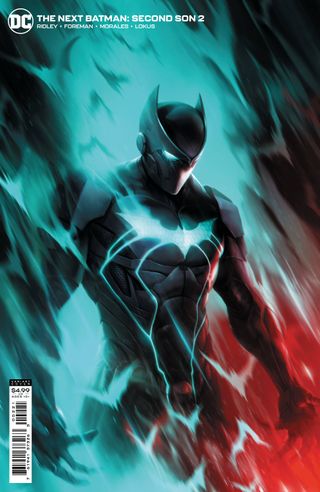
Tam is, which I think you know based on what's been published so far, she's going through a real crisis - if and when she'll recover, what that means for the family, and how that recovery takes shape I think is very important. Considering right now, that we're going through a crisis where people are dealing with recovery. To be able to tell a story that's not on the nose, but is very much rooted in the real world is very, very important to me.
I hope people get a real family dynamic. I hope that these characters aren't just - and I don't mean literal sidekicks the way Robin or Nightwing is a sidekick. Sidekicks into larger stories. For me, what's really important is telling the stories of family. Families in general, certainly the Fox family, but a family of color.
That's something I really, really understand. I'm a father, I'm a son, I'm a husband. I have days where I feel like I did a good job. I have days where I feel like I failed miserably. And having those stories that people I think can relate to beyond being wish fulfillment, beyond being very exciting, beyond distractions from the real world are very important to me. So, I would love for all of those elements to be presented throughout Second Son. And I would definitely say if we see more of Jace Fox, it's going to be associated with his family and their growth over time as well.
Keep apprised of this and all the Batmen titles with our constantly-updated list of new Batman comics, graphic novels, and collections in 2021 and beyond.
